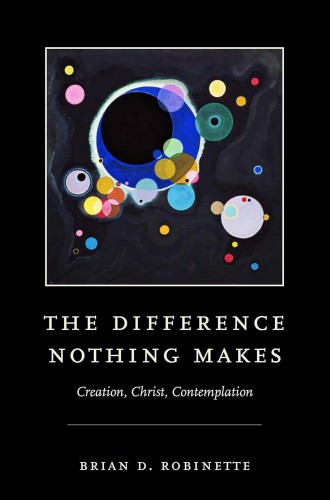Everything from nothing
Theologian Brian Robinette argues that the beleaguered doctrine of creatio ex nihilo is both important and practical.

The Difference Nothing Makes
Christ, Creation, Contemplation
Eighteen centuries on, the doctrine that God creates from nothing (creatio ex nihilo) still breeds bafflement and objections. The philosophical theologian John D. Caputo, for example, worries that this teaching funds a pernicious, ideologized picture of God as the Big Other—capricious, aloof, and domineering—whose creative fiat runs roughshod over creaturely freedom; a chastened “weak God” hypothesis, Caputo counters, better helps believers embrace dynamic biblical narratives and confront the problem of evil.
On the contrary, argues Brian Robinette, critics of creatio ex nihilo, both ancient and contemporary, have missed the mark. In a bold, sweeping, and masterful new book, the Boston College theologian defends and constructively retrieves this often beleaguered doctrine. He argues that the God who communicates Godself without reserve in the life, death, and resurrection of Jesus Christ is the One who brings everything—being, life, communion, and wonder—from nothing. This doctrine, when rightly deployed, fosters lives of prayerful gratitude, joyful self-abandonment, and abiding hope in the face of suffering and death. Creatio ex nihilo, Robinette contends, is no abstract, speculative claim about when and how the world began. It is, rather, a profoundly practical teaching that can inform and inspire projects of nonviolence, ecological renewal, and non-defensive engagements with contemporary thought and culture. Robinette writes: “As challenging as it may be for us to imagine, the world we typically take for granted, the only world we actually know, is wholly gratuitous, without necessary existence, and utterly dependent upon an unfathomable God for its very being.”
Creatio ex nihilo, in Robinette’s interpretation, embeds positive claims about the loving compassion of God and the goodness of creation within a series of uncompromising negations. The Creator is no being, not even the highest being, but relates, freely and compassionately, to God’s creatures in ways that are non-dualistic, non-oppositional, and non-contrastive (Kathryn Tanner’s term). As the apophatic, mystical theologian Pseudo-Dionysius taught, even the notion of “being” itself misleads. God is not the upper pole on a spectrum of existence; between Creator and creation lies no intermediary or demiurge (contra the ancient Gnostics and Middle Platonists). Paradoxically, though, only the God who grounds and transcends finite existence utterly is free to enter creation freely, fully, agapically, and pacifically as a creature, Jesus Christ.




